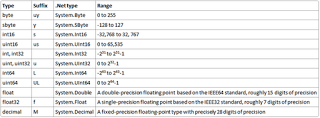
A type is an abstraction and is primarily about enforcing safety. F# is statically typed, meaning that type checking is done at compile time. For example, if a function accepts an integer as a parameter, you will get a compilation error if you try to pass a non integer value.
F# contains two varieties of numeric primitives as integer and floating point numbers. All numerical primitives are listed in the attached diagram. F# uses a let binding to create a value for numeric primitives. It allows to specify values in hexadecimal (base 16), octal (base 8) or binary (base 2) with prefix 0x, 0o, 0b. Few let bindings are:
> let hex =0xFCAF;;val hex : int = 64687> let bin =0b00101010y;;val bin : sbyte = 43y
Arithmetic
You can use standard arithmetic operators on numeric primitives as +, -, *, /. Sample F# code is:
> 32450s + 1s;;val it : int16 = 32451s
By default, arithmetic operators do not check for overflow. So, if you exceed the range, the result will overflow to be negative.
Math
F# features all the standard math functions as:
abs - Absolute value of a numberceil – Round up to the nearest numberexp – Raise a value to a power of efloor – Round down to the nearest integerpown – Power of an integersqrs – Square root of a given number
Conversion
F# doesn’t perform implicit conversions for primitive types. As an example, assigning int64 to int16 eliminates subtle bugs by removing surprise conversions. Developer must use an explicit conversion function like System.Convert.
Bitwise Operation
Primitive integer types support bitwise operators for manipulating values at a binary level. Bitwise operators are &&& - and, ||| - or, ^^^ - xor, <<< - left shift, >>> - right shift.
BigInt
If the application is dealing with larger data, F# provides BigInt type for representing arbitrarily long integers. BigInt uses I suffix for literals as:
> open System.Numericslet megabyte = 1024I * 1024Ilet gigabyte = megabyte * 1024I
Although BigInt is heavily optimized for performance, it's much slower than using the primitive integer data types.
